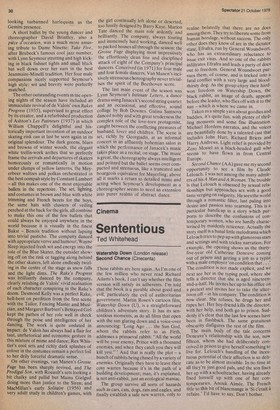Cinema
Sententious
Ted Whitehead
Watership Down (London release) Second Chance (Cinecenta) Those rabbits are here again. As I'm one of the few million who never read Richard Adams's book, I can't say whether the film version will satisfy its adherents. I'm told that the book is a parable about good and evil, particularly the evil of authoritarian government. Martin Rosen's cartoon film, Watership Down (U), is a straightforward children's adventure story. It has its sententious moments, as do all films that open with the sun glaring down and a voice-over announcing: 'Long Ago . . . the Sun God, whom the rabbits refer to as Firth, addresses a primaeval rabbit: "All the world will be your enemy, Prince with a thousand enemies, and when they catch you they will kill you." ' And that is really the plot — a bunch of rabbits being chased by a variety of enemies. Originally they have to leave their cosy warren because it's in the path of a building development; man, it's explained, is not anti-rabbit, just an ecological maniac.
The group survive all sorts of hazards such as cars, cats, dogs, rats and eagles, and finally establish a safe new warren, only to realise belatedly that there are no does among them. They try to liberate some from human bondage, without success. The only other does they know of are in the dictator state, Efrafra, run by General Woundwort, who has an extraordinary reluctance to issue exit visas. And so one of the rabbits infiltrates Efrafra and leads a party of does out to freedom. General Woundwort pursues them, of course, and is tricked into a fatal conflict with a very large and blood thirsty dog. As the group enjoy their hardwon freedom on Watership Down, the black rabbit, an image of death, appears before the leader, who flies off with it to the sun — which is where we came in.
Taken as a simple yarn about goodies and baddies, it's quite fun, with plenty of thrilling moments and some fine illustration. Michael Hordern narrates, and the voices are beautifully done by a talented cast that includes John Hurt, Richard Briers and Harry Andrews. Light relief is provided by ,Zero Mostel as a black-headed gull who seems to have flown in from Central Europe. Second Chance (AA) gave me my second opportunity to see a film by Claude Lelouch. I was not among the many admirers of hisA Man and A Woman. The trouble is that Lelouch is obsessed by sexual relationships but approaches sex with a good taste verging on vulgarity. He sees the world through a romantic filter, lust paling into desire and passion into yearning. This is a particular handicap in a story which purports to describe the confusions of contemporary women, who are hardly characterised by maidenly reticence. Actually the story itself is a banal little melodrama which Lelouch tries to pep up with glamorous stars and settings and with tricksy narration. For example, the opening shows us the thirtyfive-year old Catherine Deneuve coming out of prison and getting a job as a typist with a male employer 'on condition that . . The condition is not made explicit, and we next see her in the typing pool, where she tells a director that she is aged nineteenand-a-half. He invites her up to his office on a pretext and invites her to take the afternoon off — in his company. The condition is now clear. She refuses, he drugs her and rapes her. Her boy-friend kills the director, with her help, and both go to prison. Suddenly it's clear that the last few scenes have been in flashback. The same gratuitous obscurity disfigures the rest of the film.
The main body of the tale concerns Deneuve's relationship with the son, now fifteen, whom she had deliberately conceived in prison to give herself something to live for. Lelouch's handling of the incestuous potential of their affection is so delicate as to be almost invisible. In no time at all they're just good pals, and the son fixes her up with a schoolteacher, having already fixed himself up with one of her contemporaries, Anouk Aimee. The French title to this bit of blancmange is 'Si c'etait refaire.' I'd have to say, Don't bother.






































 Previous page
Previous page